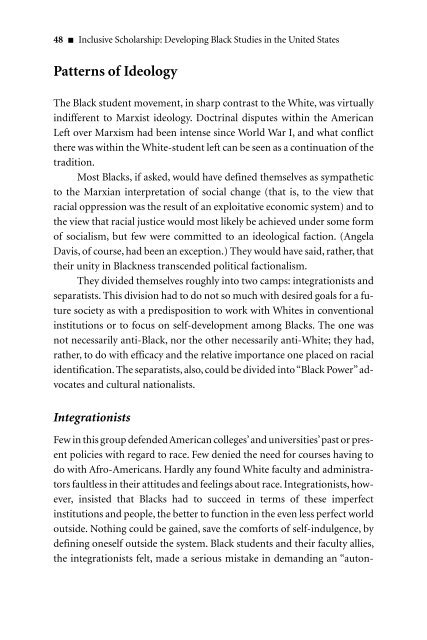Inclusive Scholarship: Developing Black Studies - Ford Foundation
Inclusive Scholarship: Developing Black Studies - Ford Foundation
Inclusive Scholarship: Developing Black Studies - Ford Foundation
Create successful ePaper yourself
Turn your PDF publications into a flip-book with our unique Google optimized e-Paper software.
48 <strong>Inclusive</strong> <strong>Scholarship</strong>: <strong>Developing</strong> <strong>Black</strong> <strong>Studies</strong> in the United States<br />
Patterns of Ideology<br />
The <strong>Black</strong> student movement, in sharp contrast to the White, was virtually<br />
indifferent to Marxist ideology. Doctrinal disputes within the American<br />
Left over Marxism had been intense since World War I, and what conflict<br />
there was within the White-student left can be seen as a continuation of the<br />
tradition.<br />
Most <strong>Black</strong>s, if asked, would have defined themselves as sympathetic<br />
to the Marxian interpretation of social change (that is, to the view that<br />
racial oppression was the result of an exploitative economic system) and to<br />
the view that racial justice would most likely be achieved under some form<br />
of socialism, but few were committed to an ideological faction. (Angela<br />
Davis, of course, had been an exception.) They would have said, rather, that<br />
their unity in <strong>Black</strong>ness transcended political factionalism.<br />
They divided themselves roughly into two camps: integrationists and<br />
separatists. This division had to do not so much with desired goals for a future<br />
society as with a predisposition to work with Whites in conventional<br />
institutions or to focus on self-development among <strong>Black</strong>s. The one was<br />
not necessarily anti-<strong>Black</strong>, nor the other necessarily anti-White; they had,<br />
rather, to do with efficacy and the relative importance one placed on racial<br />
identification. The separatists, also, could be divided into“<strong>Black</strong> Power”advocates<br />
and cultural nationalists.<br />
Integrationists<br />
Few in this group defended American colleges’and universities’past or present<br />
policies with regard to race. Few denied the need for courses having to<br />
do with Afro-Americans. Hardly any found White faculty and administrators<br />
faultless in their attitudes and feelings about race. Integrationists, however,<br />
insisted that <strong>Black</strong>s had to succeed in terms of these imperfect<br />
institutions and people, the better to function in the even less perfect world<br />
outside. Nothing could be gained, save the comforts of self-indulgence, by<br />
defining oneself outside the system. <strong>Black</strong> students and their faculty allies,<br />
the integrationists felt, made a serious mistake in demanding an “auton-

















